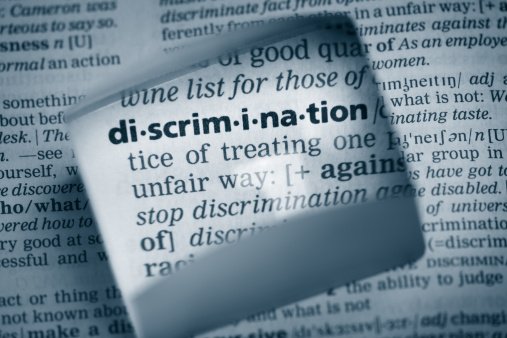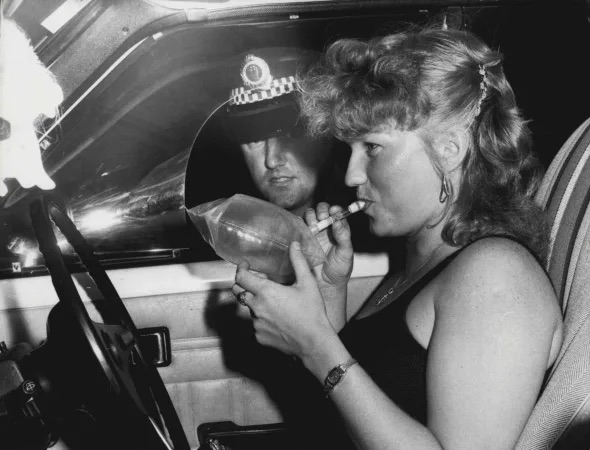How often have you lost a job or not got a job? You know it’s because of your visual impairment. But how can you prove it? Employers are not going to admit to it. In Australia discrimination against job seekers who are visually impaired is still common. Naturally this makes them reluctant to disclose their disability at the interview. If they decide to disclose their disability after they get a job, according to statistics, more often than not, they’re shown the door.
A survey about discrimination against visually impaired workers and job seekers was reported on the news recently. The survey concluded that people with vision impairment. still face discrimination when applying for jobs and keeping jobs. This started me thinking about some of my personal experiences of discrimination in the workplace.
It gave them a good laugh
First, there was the plumbing showroom. I was the only female working in the establishment and was treated like an idiot by all bar one of the males from day one. I had chosen to disclose my vision impairment on day three of the job. Instead of showing support, the males had a good laugh whenever I bumped into a carton or the like. This happened a lot because my workspace happened to become a depository for deliveries.
There was no conversation
As the weeks moved on, the level of disrespect towards me increased. My movement around the workplace was restricted. As the building was on two levels, they placed a sign at the bottom of the stairs in bold red writing. ‘Annette, no further’. Fortunately, I noticed it when I was about to head upstairs. Going upstairs to get plumbing fixtures for customers was a regular part of my job. That meant I could no longer do my job satisfactorily. They didn’t have to show me the door. It was clear that their strategy was to drive me out.
The perfect man
After 20 years working in a government department, I was removed from a job on two grounds of discrimination as far as I’m concerned. Being visually impaired and being an older woman in the workplace. I was replaced with a perfect man. Young and fully sighted. But that’s all. His specialist qualifications and experience paled in comparison to mine. Not only that, he was also on contract whereas I was a permanent employee. When I received the news, I was shocked. My colleagues were shocked. Some of them even shed a tear when I made my farewell speech.
The department’s method was cruel. Instead of showing me the door, I was transferred to another location within the department. The position was untenable given my low vision. Even though my manager knew about my visual impairment, she requested a medical report from my ophthalmologist. That resulted in a meeting with my manager and a representative from HR. The meeting was pathetic, exacerbated by their ignorance of my disability.
The solution
The outcome of the meeting resulted in the offer of a second untenable location. Eventually I decided to make a complaint to the Industrial Relations Commission. Unfortunately, I wasn’t able to attend the hearing because the whole scenario caused my health to deteriorate to the point where I could no longer work. I took four months sick leave before leaving my home state of Tasmania and moving to Melbourne, Victoria.
The students cared
After months of applying for jobs and going for interviews in Melbourne, I got a job at an international school teaching English. I didn’t disclose my vision impairment at the interview. But a few days after I had started, I told my manager. He brushed it off with ‘no problem’. On the same day I told my adult students. They were interested and wanted to know about my disease and how they could help. They were wonderfully supportive and always ensured the classroom was unobstructed so I could move around easily.
All he could say was ‘no problem’
Outside the safety of my classroom, it was a different story. Bumping into students, furniture was a common occurrence. I can’t believe my manager didn’t notice there was something wrong, so I told him again. His response was the same as the first time. ‘No problem’. Obviously, he didn’t care because he put me on the roster until the end of the year, three months away. Despite my concerns about lack of support, I was loving the job and feeling like I was really part of the team.
I was ‘no problem’. I was out the door ….
It all came to an abrupt end the day I took my class group on the mandatory annual excursion. We went to a local park for a picnic. I had to dismiss the students early because I had tripped over a giant rock. The impact of the fall caused a minor back injury. Two students accompanied me back to school. Finally, the manager reacted by sending me home immediately. I never heard from him or anyone else from that workplace again. Not only that, I had also been removed from the emailing list and my account had been blocked.
A different strategy –
I continued applying for jobs and finally got an interview as an English as an Additional Language (EAL) teacher at a community centre. This time I decided to disclose my visual impairment towards the end of the interview. My interviewers were not fazed. They continued the interview with questions about my disability. They asked how they could support me in the workplace. Then they looked at each other and said, ‘when can you start?’
Almost three years on I’m still teaching at the community centre and loving it. There are no secrets. All my colleagues know about my disability and are so supportive. They rearranged furniture in the workplace so I could navigate easily around the building. They gave me the biggest classroom. They welcomed a visit from my mobility and orientation specialist from Vision Australia. I’ve never worked in a more supportive and inclusive workplace. I’m beginning to realise that one day I will have to leave because my vision will make my job more difficult. But it will be on my terms. Not because I have been shown the door.
This article was inspired by Lee Chong. My story has lots of similarities to hers. Read about Lee Chong …
Image from Unsplash




